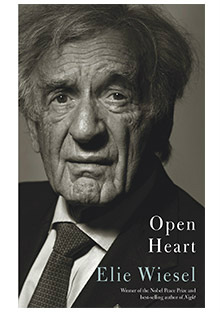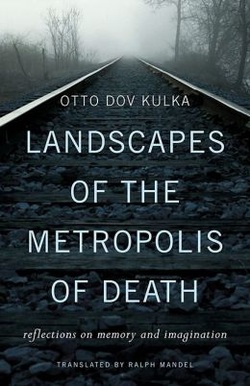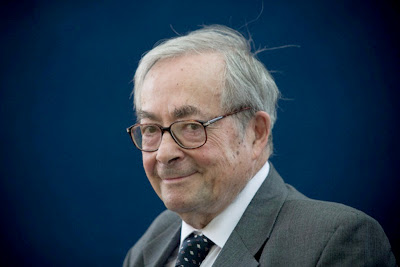|
Professor George Steiner, Extraordinary Fellow, Churchill College, Cambridge Pears Institute for the Study of Antisemitism, Birkbeck College, University of London May 17, 2012 In this lecture, entitled "Homelands," Professor Steiner argues that the history of the Jews and of Jewish identity has been characterized by radical inner tensions. These tensions, Professor Steiner suggests, oscillate between priest and prophet, the desert and the city, Zionism and the hopes and ideals of the Diaspora. The Shoah and its legacy have accentuated such divisions. Yet, Steiner argues, the opposing ideals are inextricably interwoven. Is it possible, he asks, to make any responsible conjectures to the future? George Steiner is a Fellow of Churchill College, University of Cambridge. He has held professorships at Yale, Geneva, New York and Oxford and was elected Fellow of the British Academy in 1998. He is a renowned literary critic, essayist, novelist, scholar and teacher, having published more than 25 books. In his writing he explores comparative literature and the nature and power of language. A further biding concern has been the implication of the Shoah for our understanding of civilization and culture. Listen to the Lecture Podcast  As he approaches emergency open heart surgery, Elie Wiesel reflects back on his life in a new book entitled, Open Heart. Below is an excerpt: June 16, 2011 "It's your heart," says the gastroenterologist after performing an endoscopy on me. I am surprised: "Not my stomach?" For some time now, acid reflux has been one of my nightmares. My longtime general practitioner also feels it has contributed to the various health problems that have afflicted me for the past several years. My wife, Marion, and I have just returned from Jerusalem, where, every year, we spend the holiday of Shavuot with close friends. In keeping with the tradition to which I have remained faithful, friends and I spent the night in a yeshiva in the Old City studying biblical and Talmudic laws and commentaries dating from the Middle Ages. This time, in Jerusalem, it had all gone well. No terrorist attacks. No border incidents. Even my cursed migraines seemed to respect the sanctity of this night, of this city unlike any other. But now, back in New York, suddenly my body revolts. The new piercing pain in my shoulders rises all the way to my jaw. I swallow a double dose of Nexium, the medicine I take for acid reflux. This time without success. "No, neither the stomach nor the esophagus," replies the doctor after a moment of silence. "It's certainly the heart." Ominous words, inducing fear and the promise of more pain. Or worse. As soon as he receives his colleague's message, my primary care doctor, a cardiologist, reaches me at home. On the phone, he appears to be out of breath; he speaks in a tense, emphatic voice, louder than usual. I have the feeling that he is trying to contain or even hide his nervousness, his concern. Clearly, he is unhappy to have to give me this bad news that will change so many things for me . . . "I expected a different result," he explains. "But now the situation requires some further tests immediately." "Yes?" "Please come to Lenox Hill Hospital right away. I am already there." I protest: "Why? Because it's the heart? Is it really that urgent? I have never had a problem with my heart. With my head, yes; my stomach too. And sometimes with my eyes. But the heart has left me in peace." At that, he explodes: "This conversation makes no sense. I am your cardiologist, for heaven’s sake! Please don't argue with me! You must take a number of tests that can only be administered at the hospital. Come as quickly as you can! And take the emergency entrance!" On occasion, I can be incredibly stupid and stubborn. And so I nevertheless steal two hours to go to my office. I have things to attend to. Appointments to cancel. Letters to sign. People to see—among others, a delegation of Iranian dissidents. Strange, all this time I am not really worried, though by nature I am rather anxious and pessimistic. My heart does not beat faster. My breathing is normal. No pain. No premonitions. No warning. After all, hadn't I just three days ago gone through a complete checkup with all kinds of tests, including a cardiogram, administered by my physician, the same one who is now ordering me to the hospital? There had been no indication of a coronary problem: no chest pain or feeling of oppression. What has changed so abruptly in my body to destabilize it to this extent? All right, I'll go to the hospital, since both doctors insist. I don't take anything along. No books, no spare shirt, no toothbrush. Marion says she wants to accompany me. I try to discourage her. In vain. A team of specialists is waiting for me in the emergency room. The very first blood test instantly reveals the gravity of my condition. There is a definite risk of heart attack. The doctors exchange incomprehensible comments in their own jargon. Their conclusion is quick, unambiguous and unanimous: An immediate procedure is required. There can be no delay. Marion whispers in my ear that we are fortunate; she has just learned that the surgeon who will perform the angiogram is the one who operated on her two years earlier. I remember him, a handsome, strikingly intelligent man. I had been struck by his kindness as much as by his competence. "I hope," he tells me, "that we will be able to do for you what we succeeded in doing for your wife: to restore a normal flow of blood in the arteries by inserting a stent." But then he adds, looking grave, "I must warn you that we may have to intervene in a more radical way. We will know very soon." I am drowsy and fight against sleep by trying to follow the brief professional exchanges in the operating room. Actually, I don't understand a word. About an hour later, I hear the surgeon saying, "I am so sorry, I don't have good news for you: Your condition is such that the insertion of a stent won’t suffice. You have five blocked arteries. You require open-heart surgery." I am shaken. Sure, I know that these days open-heart surgery is regularly performed the world over. Dr. Christiaan Barnard's face appears before me; I had met the famous surgeon at a conference in Haifa and we had engaged in a long dialogue on medical ethics, comparing Judaic and Christian points of view. I had looked at his hands, wondering how many human beings owed them their survival. But now the words "open-heart surgery" are meant for me. And they fill me with dread. "You're lucky. A colleague of mine, an expert in this type of surgery, is at the hospital right now. I have spoken to him. He is ready to operate on you." "Doctor," I ask, "have you told my wife?" "No, but I will do it right now." In a moment he is back: "I've seen Marion. As well as your son, Elisha." The fact that my beloved son is already at the hospital does not surprise me. Since his earliest childhood, he has always made me proud, always been there for me. "What do they think?" "They agree; we have no choice. But the decision is yours alone." "May I see them?" Marion and Elisha are not good at hiding their anxiety. Their smiles seem forced. And how am I to hug them without falling apart? Marion, holding back her tears, tries to reassure me: "The doctors are optimistic. The surgeon they propose is world-renowned." "It will go well," says Elisha. "I know it, Dad. I am convinced of it." I remain silent. "Shall we go?" urges the attending physician. The nurses are ready to push the gurney toward the OR. I steal another glance at the woman with whom I have shared my life for more than forty-two years. So many events, so many discoveries and projects, unite us. All we have done in life we have accomplished together. And now, one more experience. As the door opens, I look one last time at our son, the fine young man who has justified—and continues to justify—my life and who endows it with meaning and a hereafter. Through the tears that darken the future, a thought awakens a deeper concern, a deeper sorrow: Shall I see them again? Excerpted from Open Heart by Elie Wiesel. Copyright © 2012 by Elie Wiesel. How Emergency Open-Heart Surgery Changed Elie Wiesel In June 2011, Elie Wiesel underwent emergency open-heart surgery at age 82 after doctors found he had five blocked arteries. Watch as he opens up to Oprah about why he wasn't sure he would make it through, his fear of dying, and the first thing his grandson said to him when he came out of surgery. Plus, find out why Elie says he came out of surgery loving his life—and those in it—even more.  Landscapes of the Metropolis of Death, by Otto Dov Kulka, translated by Ralph Mandel, Allen Lane, 144 pages, Published in the US in March by Belknap Press. Review by Simon Schama, Financial Times It is commonplace that in the matter of the Holocaust, words fail us. Language, especially the wrought language of literature, struggles to register atrocities unrecognisable as the acts of sentient humans. Yet however unequal to the task, writers persist in their efforts to give form to smoke; to match words to madness. Sometimes, pardonably, fiction writers fall into the error of encompassing enormity by acts of literary violence. Monsters of prosody result which, with every shriek amid the bloody mire, only draw attention to how far they miss the mark. But, silence being the handmaid of oblivion, nothing is not enough. The memory-vacuum will quickly be filled by the lies of deniers, whose numbers are increasing not diminishing. So chroniclers of what Otto Dov Kulka calls “the Great Death” continue to be torn between redundancy and futility. The dilemma is particularly acute among the dwindling band of survivors whose personal testimony is unreproducible by second-hand accounts, yet who are traumatically burdened with the indecency of adjectives; the sense that writing may never be more than an artificial simulacrum of what remains buried in their nightmares like deep-lodged shrapnel. Was that book, one wonders, the work of Primo Levi, who may himself have been a fatal casualty of the struggle between word and memory? Like Levi and HG Adler, Kulka has long wrestled with what he should do with his burden of recall, some of it, like the sense of being perpetually returned to the gates of Auschwitz, mercilessly involuntary. Like Adler (in his sober non-fiction) Kulka has elected to steer clear of anything resembling autobiography and to address the horror instead with the analytical tools of the historian. But that turns out not to have given him peace. So over the years he confided to a tape recorder his dreams, nightmares and memories, which so far from being shrouded in the wraithlike indeterminacy of phantoms, have, for better or worse, remained visions of unsparing precision and concreteness. Fortunately for us all, he has been persuaded by friends and the promptings of his own formidable decency to turn those spoken recollections and meditations into the astonishing book that is Landscapes of the Metropolis of Death. In its essence this is not so much a book about Auschwitz as one about coming to terms with the shock of survival. Like the 11-year-old Kulka, who came within a few hundred metres of the crematoria, assuming that he would perish there, the writing hovers around the incineration, as he puts it, “like a moth circles a flame”. The origins of the book in Kulka’s patient but exacting self-interrogations; his postwar circumlocutions and confrontations; the visit to the camp, once with his father who also survived; the attempts to liberate himself from the nightmare of obligatory return by doing just that – all mean that Kulka’s style is bony and austere, with scarcely a note of literary striving in the hundred-odd pages. His prose is halting and broken as befits its subject; interspersed with black-and-white photographs which in their amateurishness make no attempt to frame the magnitude of what they ostensibly record: the stoved-in remains of the crematoria; the “forest of concrete pillars” once supporting the barbed wire electrified fences that held the population captive. WG Sebald, acknowledged as one of those encouraging Kulka to write and publish, is an obvious and appropriate model for wrestling quietly with the infernal. Kafka, too, supplies sympathetic correlates for Kulka’s perplexities. Yet amid the fragmentary, digressive impressions are images of terrible poetic concreteness: the black stains of the Death March which resolve into corpses shot by the Germans and dumped at intervals by the snowy roadside; the “speck” of his mother in “a thin skirt that rippled in the breeze” as she walked off to a labour camp without ever turning her head to look back one last time at her son; a prisoner attempting to dodge the rain of blows beating down on him from the SS through a kind of “grotesque, bizarre dance”. What, ultimately, makes Kulka’s book unlike any other first-hand account written about the camps is the authenticity of its vision of an 11-year-old boy. By some freak of fate (the logic of which is explained at the end of the book), Otto and his mother, who had volunteered to go from the notoriously fake “resettlement” village of Theresienstadt to Auschwitz, were exempt from the usual merciless division between those swiftly destined for the crematoria where “the living, who enter in their masses in long columns and are ... transformed into flames, into light and smoke, then disappear and fade into those darkening skies”, and those fit enough to slave until they too, after six months, shrink into the skeletons covered by yellow skin he sees carted away each day from the barracks dump. Instead, Kulka and his mother are mysteriously lodged, with thousands of others, in a familienlager, a family barracks where they are spared the shaven heads and camp uniform; where the boy even gets to sleep beside his mother. The barracks turns into a true school, where the future historian learns for the first time of Thermopylae and Salamis; where the children perform an opera and, in an act of stupendous defiance of their fate, sing Schiller’s words and Beethoven’s melody of “Ode to Joy”. But this miraculous capsule of cultural survival within Auschwitz is, of course, a calculated contrivance of Nazi propaganda, designed to persuade Theresienstadt prisoners that these were the conditions that awaited them upon resettlement to the east, and to convince inspectors from the International Red Cross that reports of torture and immolation were baseless slanders. Once the IRC had fallen for the propaganda stunt at Theresienstadt, there was no further need for its Auschwitz counterpart. Five thousand mothers and children sharing Kulka’s barracks were taken at one fell swoop to the gas chambers, leaving room for another group who in six months would be similarly disposed of. By one of the strokes of luck that Kulka recognises as determining the fate of the doomed, he and his mother were in the camp hospital with diphtheria when the rest of the familienlager were murdered. There are other moments of fortune that left Kulka possessed by a sense of reckoning suspended rather than obviated. Handing his father a bowl of soup through the electrified fence, his hands (curious to see if the touch was fatal) stick to the wire. The boy assumes he is already dead and is amazed to discover that the landscape of Birkenau remains in his sight in the afterlife. Then he has to ensure that the burns, which turn lacerating and pus-swollen, are not discovered since his unfitness for labour would send him summarily to the crematoria. All this is unimaginably horrifying, yet through the eyes of little Otto we can, again, apprehend it. In a particularly moving passage, he considers himself spared the “acute, murderous, destructive discord and torment felt by every adult inmate who was uprooted and wrenched from his cultural world ... and which was almost always one of the elements of the shock that often felled them within a short time”. For him, he writes, that shock “did not exist because this was the first world and the first order I had ever known: the order of the selections, death as the sole certain perspective ruling the world”. Whether or not setting all this down has done anything to relieve the unrelenting grip the “metropolis of death” holds on his mind, or whether it has tightened that hold, Kulka does not say. But since he has done the rest of us – and the world – so great a kindness by writing his book, one hopes for his sake the former. Ending in Jerusalem with his going “to usher in Shabbat with the children of the sons and daughters of Job the Just”, he offers the barest glint of sunlight amid a thunderous darkness. Simon Schama is an Financial Times contributing editor. His BBC television series ‘The History of the Jews’ is due to be aired later this year. |
CISA Blog
This blog provides selective critical analysis on developments in contemporary culture related to the subjects of antisemitism, racism, the Holocaust, genocide, and human rights.
|

 RSS Feed
RSS Feed